Farley at 15
Since 2008, the Farley Center for Entrepreneurship and Innovation has educated and empowered the University’s enterprising minds.
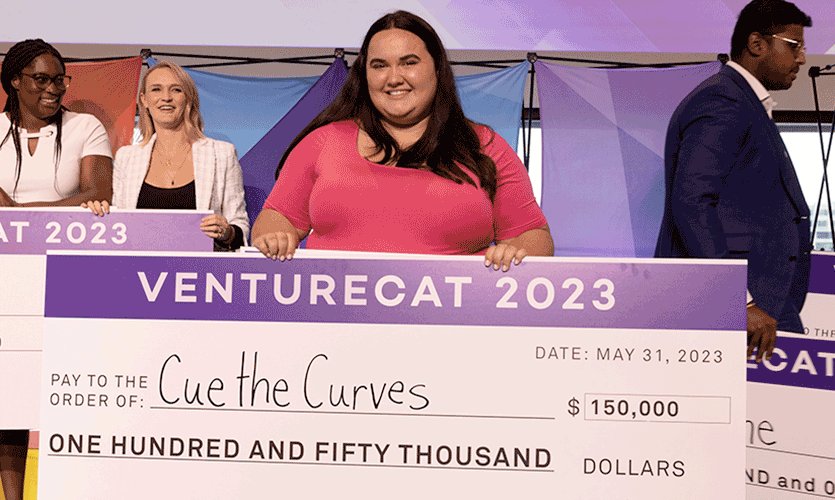
As a first-year industrial engineering student at Northwestern University, Charlotte Oxnam (’23) launched a fashion blog dedicated to plus-sized women called Cue the Curves.
At first a hobby, Cue the Curves became a passion and, slowly, Oxnam saw the outlines of a potential business. She heard Northwestern’s Farley Center for Entrepreneurship and Innovation helps students gain entrepreneurial skills through for-credit classes taught by real-world entrepreneurs and other experts. She enrolled in her first Farley class, NUvention: Web and Media, now simply NUvention: Media, as a second-year student.
Farley faculty guidance informed her tactical decision making. Through four additional Farley classes, Oxnam strengthened her entrepreneurial muscles in key areas like accounting, marketing, and branding to advance Cue the Curves, which evolved into a dynamic shopping app designed for young plus-size women and clothing brands.
After winning $160,000 — the grand prize — in May at VentureCat, Northwestern’s annual student startup competition, the since-graduated Oxnam has been plotting Cue the Curves’ next steps. A public platform already boasting nearly 5,000 users, swelling national attention, partnerships across the fashion industry, and three full-time team members, Cue the Curves is preparing for a bright future.
“I’m not in this position without the Farley Center,” Oxnam said. “My experience at the Farley Center empowered me to believe I could build a business and then gave me the skills and knowledge to do just that.”
Oxnam is among the latest examples of the Farley Center’s ongoing push to drive entrepreneurship and innovation at Northwestern, a tradition now in its 15th year.
A home for entrepreneurship and innovation
The Farley Center originated from climbing student interest in entrepreneurship and a gap in Northwestern’s evolving entrepreneurial ecosystem.
In the early 2000s, enterprising students had but a few entrepreneurship classes to choose from at Northwestern. At the same time, recently named McCormick School of Engineering dean Julio M. Ottino was championing the concept of “whole-brain engineering,” including curriculum in design, innovation, and entrepreneurship, to help students see different pathways to apply their engineering skills.
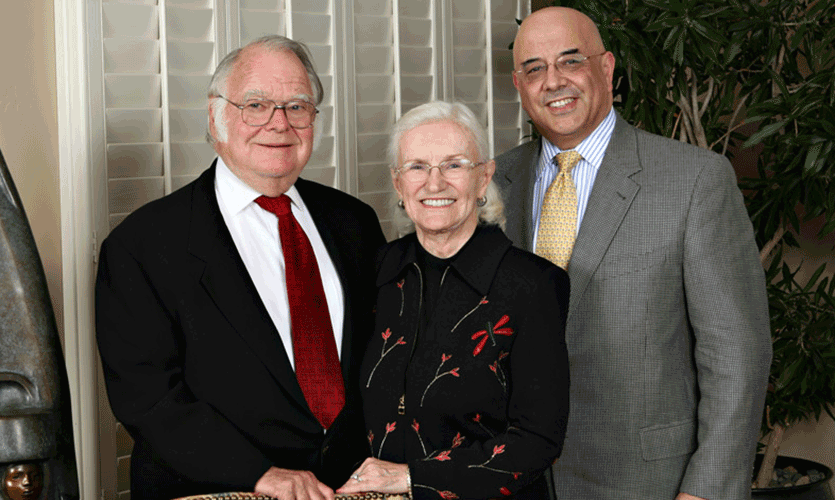
The Northwestern Engineering-housed Farley Center, led by founding director Mike Marasco, emerged as a compelling remedy to a glaring need. The cross-disciplinary center, open to all Northwestern students, was endowed in 2008 by a gift from the James N. and Nancy J. Farley Foundation. The center’s first class, NUvention: Medical, characterized the center’s boldness. Over two quarters, several dozen graduate and undergraduate students representing four academic disciplines (engineering, business, medicine, and law) formed interdisciplinary teams, developed medical devices, created business plans, and collectively filed a total of 11 provisional patents.
NUvention: Medical set a new standard in entrepreneurship education — one soon modeled by other institutions — and the center would go on to unveil other NUvention classes covering areas like energy, media, and arts and entertainment.
“NUvention classes are a distinguishing mark of the Farley Center,” said Mark Werwath, a Farley Center faculty member since 2012. “They hit on everything we promote: innovation, collaboration, business creation, and more.”
Over the years, Farley students have won countless business plan competitions and claimed spots in prestigious startup accelerators. Some have continued class-born projects after graduation, raising funding and generating revenue.
Hazel Technologies, a food tech startup founded by Aidan Mouat (PhD ’16), raised $70 million in 2021 and in 2023 was named one of the Global Cleantech 100 for a second consecutive year. Blip Energy, a startup that produces affordable smart home batteries, was founded by Sophia Wennstedt (MMM ’22) who was named to Forbes ‘30 Under 30’ list in the energy category.
Educating and empowering innovators and entrepreneurs
Today, the Farley Center is the academic cornerstone of Northwestern’s robust entrepreneurship and innovation ecosystem. Since 2018, the center has offered an entrepreneurship minor, replacing a certificate program, and has greatly expanded the scope and quantity of classes. This academic year, the center will offer a record 38 classes, up from 30 last year, on topics ranging from leadership and ethics to corporate innovation and improvisation. Cutting-edge technologies, including generative AI, are emphasized across classes.
The Farley Center continues to attract undergraduate and graduate students from all Northwestern schools. Approximately 70 percent of the 1,000 students enrolled in Farley classes each year, including 120 students pursuing the entrepreneurship minor, come from outside Northwestern Engineering.
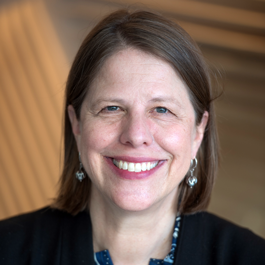
The center’s faculty roster includes boundary-breaking researchers, serial entrepreneurs, and tech executives. Longtime facu
lts members include John Rogers, a bioelectronics pioneer, serial entrepreneur, and Northwestern Engineering faculty member, and Neal Sales-Griffin, who leads Techstars in Chicago, San Francisco, and Oakland. Recent faculty appointments include Michael Saunders, who served as entrepreneur-in-residence at GrubHub after the food delivery company acquired his startup, and Jen Baker, an expert in communication theory and practice.
“A key benefit of a Farley education — whether you plan to launch a startup or not — is gaining entrepreneurial skills and developing an innovative mindset,” Farley director Hayes Ferguson said. “We are very proud of our students who go on to build successful companies, but we are equally excited about those who leverage their Farley education while pursuing other careers.
Examples of such alumni include Eden Hirschfield ('22), startup success manager at Google, and actor and musician Brian Eng ('20). “Farley reinforced my understanding that I am running a business as an artist, and the more I can proactively maintain an entrepreneurial mindset and practice, the more opportunities I’ll get,” Eng said.
Commitment to experiential learning and collaborative innovation
In keeping with its focus on experiential learning, the Farley Center recently launched the Bay Area Quarter, a 10-week immersive experience in San Francisco mixing four carefully crafted classes with site visits, externships, and other front-row experiences in the nation’s innovation epicenter.
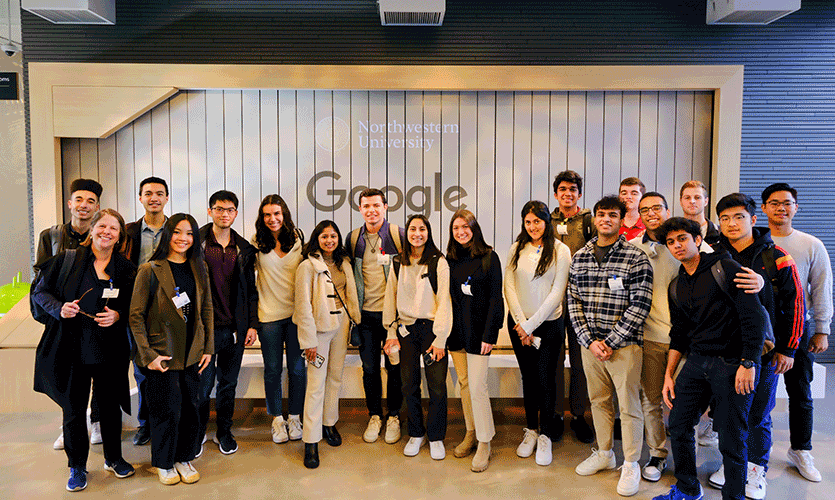
“Over and over, we hear that the experiential educational opportunities we offer, the ones where students learn by doing and seeing, are transformative,” said Ferguson, a clinical professor and veteran of startups who took over the helm of the center in 2020.
The center has ramped up collaborations, both on campus and beyond. The Farley Center works closely with The Garage, Northwestern’s extracurricular student startup incubator, co-sponsoring events, and advising the student entrepreneurship club EPIC. Farley and The Garage support the esteemed VentureCat competition, alongside the Donald Pritzker Entrepreneurship Law Center and the Kellogg School of Management. The center also enjoys a partnership with Medill’s Knight Lab. Knight Professor in Digital Strategy Jeremy Gilbert coteaches the NUvention: Media class with Northwestern Engineering computer science professor Larry Birnbaum.
“Collaborating helps us all become much stronger, and that’s evident with the University’s growing reputation for offering a world-class education in entrepreneurship and innovation,” Ferguson said.
In an external alliance, Farley introduced in 2022 a class called Backable: Building an Innovation Practice in partnership with The Second City, Chicago’s famed comedy operation, and based on Northwestern graduate Suneel Gupta’s book, Backable. The class, taught by Anne Libera (SOC ’86), director of comedy studies at Second City, teaches students the subtle art and behavioral science of expressing and gaining support for new ideas.
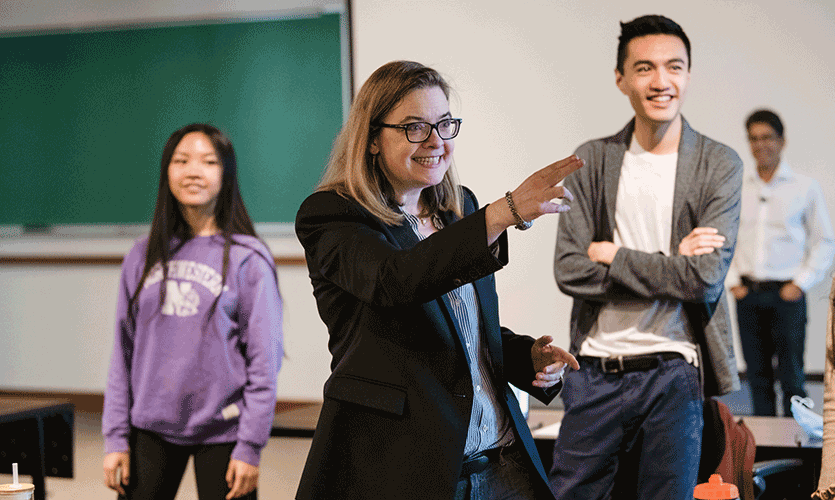
Other new classes include Entrepreneurship in Synthetic Biology, cotaught by Matt Barnard, CEO of BCD Bioscience and cofounder of Plenty, and Lisa Dhar, Northwestern's associate vice president of innovation. In the Tech Ethics class offered through the Bay Area Quarter, Rob Chesnut, Airbnb's former general counsel and first chief ethics officer, takes the lead.
Farley students also have access to dynamic guest speakers and mentors who coach startup teams. Recent visitors include former IBM chair and CEO Ginni Rometty ('79); Suchit Dash ('07), cofounder of Dubsmash and vice president at Reddit; and branding guru Adrienne Weiss.
“In a fast-changing world, we will continue to innovate as a center, ensuring that we are leaning into strengths that differentiate us, from our position at a renowned engineering school with ties to leading academic programs in journalism, business, and theater, among many others, to the extensive network of accomplished professionals who are willing to share wisdom and expertise with our students,” Ferguson said.
